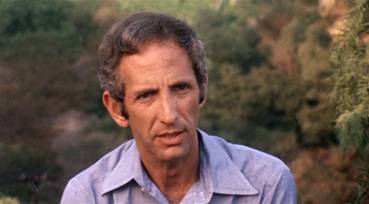| |
"If it wasn't for the people, it was very pretty. The people over there are very backward and primitive and they just make a mess of everything." |
| |
Lt. George Coker, asked by schoolchildren to describe Vietnam |
| |
|
| |
"The Oriental doesn't put the same high price on life as does the Westerner. Life is plentiful, life is cheap in the Orient." |
| |
General William Westmoreland. |
And these are just two extraordinary quotes from many – this is a film loaded with memorable,
sometimes prophetic and occasionally outrageous lines. The trick is, of course,
that none of them are scripted, but real opinions straight
from the mouths of willing participants. I'll bet real money
that with the release of the film and the passing of time,
a few of them were given cause to look back and wince at
their own words. Or at least I hope they would. But we live,
once again, in interesting times.
With the documentary feature, and especially the political
documentary feature, having recently enjoyed a popularity
boom of late, the timing seems perfect for a cinema re-release (last
year in the US) and DVD release of Peter Davis's extraordinary,
ground-breaking film from 1974 examining the damaging effects
of the Vietnam war on the American people. One of the only
films about the conflict that was made and released before
its conclusion, it has found renewed political relevance
in post-Iraq war America, where 1960s fear of communism has been traded in for 21st century terrorist paranoia,
prompting similarly polarised public and political attitudes
and quotes as dogmatic, ill-informed and simplistic as any
you'll find here.

But
despite Hearts & Minds' strongly political
standpoint, it never for a moment becomes a simplistic polemic.
The above quoted remark from Lt. George Coker, for instance,
delivered as a response to a question from a class of young
and attentive students from his old school, may seem damning
in isolation. But Cukor had recently returned home after
seven years as a prisoner of war and appears trapped in
a dreamily patriotic early-1960s time warp, even at one
point talking of how America won the Vietnam war, seemingly unaware
of what is happening around him. It's a similar story with the Emerson
family, who talk about the loss of their son in combat – they are at all times treated with respect, with their son's decision to go to
war never questioned or criticised, and only the father's devotion
to the policies of the soon-to-be-disgraced Richard Nixon
even hinting at a degree of patriotic naiveté on their part.
It's intriguing that Davis chose only to interview people who were or had been in favour
of the war, which means that all of those
presenting a critical viewpoint do so with the hindsight
of personal experience. The technique is a persuasive and effective
one: a native American talks of the absurdity of wanting
to "go out and kill some gooks" after being the
butt of extensive racism himself; an ex-pilot discusses
the dropping of bombs and napalm as a technical exercise
until he reflects on how he would he would feel if it were his own children being killed; a former marine talks about
his conflict-inspired bloodlust, only for us later to realise
that the war has left him paralysed from the waist down. Probably the
most instantly engaging interviewee is young William Marshall,
whose passion and street-talk delivery make him a most persuasive
voice of protest, though his gripe is less with the war
than the treatment of the returning soldiers. The real coups,
though, have to be the disillusioned representatives of
officialdom, of whom former Defence Aide Daniel Ellsberg
delivers perhaps the film's most potent and famous quote:
"We weren't on the wrong side, we are the wrong side."
There
is no voiceover and only a minimal use of informative captions,
but Davis delivers political body-blows through his sometimes
brilliant use of editing and juxtaposition, repeatedly presenting
what appears to be an even-handed view that is then subverted
by the footage or interview that follows it. Thus an attempt
to explain the inevitable thrill of carrying out a bombing
raid, where the pilots are distanced from their victims
and the air force technology is openly celebrated, cuts
to shots of Vietnamese peasant farmers working with the
most primitive of tools, very graphically emphasising the
technological gulf that lies between the natives and the
invading force. Elsewhere, a shot of a Zippo lighter in a
brothel, in which two American servicemen are availing themselves of the
local girls in a scene that is startling in its frankness, resonates
a few minutes later when what might as well be the same
Zippo is used to set fire to the house of a Vietnamese family,
who stand mournfully by as their lives and their home are
destroyed with no more effort or concern than it would take
to light a cigarette. Occasionally, it is the very absence
of editing where normally you would expect to see it –
most notably on the shot of elderly Vietnamese sisters,
one of whom has lost both her other sister and her home
to American bombing, that holds long after the interview
has finished – that proves most affecting, reflecting Davis's
desire to focus precisely on the aspects that normal news
broadcasts quickly pass over, the so-called 'dead air'.

Perhaps
the most striking aspect of the film is how contemporary it feels,
its use of editing, music, historical and even movie footage
providing a clear lineage to the work of modern political
documentarians like Michael Moore, who regards
Hearts & Minds as possibly the finest
documentary he's seen and has more than once cited it
as the film that inspired him to become a documentary filmmaker.
This very fact will no doubt prompt the usual "If only
Michael Moore would [insert critical bollocks here]"
moans from the one-note naysayers, but Davis himself appears
thrilled that a new generation of political documentary
feature makers have taken up the torch. The parallels to
Moore extend to this film's Academy Award win for Best Documentary,
an event that went down in Academy history (as did Moore's
notorious win) following producer Bert Schneider's reading
of a telegram of friendship from the new Vietnamese government.
This so outraged hosts Frank Sinatra and Bob Hope that they
then made their own, hastily cobbled together speech of
apology and allegiance, only to have Shirley MacLaine walk
on and offer her support for Davis and his film. After the
ceremony, Francis Coppola also spoke in the film's defence
and later told Davis that he had watched Hearts
& Minds "a couple of dozen times"
in preparation for Apocalypse Now, a film
Davis himself is a huge fan of. Davis
himself is disarmingly modest about his very considerable
achievement, but 30 years on Hearts & Minds
remains a powerful, persuasive and unsettling experience,
and still casts an awesome shadow over the present wave
of political documentary works.
Well
here's a thing. Knowing that the film was already available
in the US as part of the esteemed Criterion Collection,
I couldn't help wondering how this region 2 disk from Metrodome
would shape up by comparison. Not that I have the Criterion
disk, mind you. Well I have now, as such. Place the Metrodome
disk in your drive, select 'play film' and the first thing
you are presented with are the familiar Criterion Collection
and Janus Films logos, which surprised the hell out of me
I can tell you. From this I can presume that the transfer
has been officially licensed from Criterion and is thus
of similar quality, NTSC to PAL conversion notwithstanding
(and this does create a few minor issues). As you might
expect from such a pedigree, this makes for largely pleasing
picture quality, especially given the various source materials
used, from news footage to movie extracts to archive film
and photos. The slight softness and film grain on some of
the source material is never distracting, contrast is fine,
and the picture is largely clean of dust and damage. On
the whole, a very nice job. The framing is 1.85:1, within a small black border which
enlarges over the opening and closing credits. The picture
is anamorphically enhanced.

Sound
is Dolby 2.0 stereo and is clear and free of noise, with
separation confined largely to the music score.
The
Interview with Peter Davis (21:55)
is non-anamorphic 16:9 and suffers from very fluffy sound,
but the content is useful, putting a face to the man and
providing information on his arrival to the project by way
of his earlier CBS documentary, The Selling of the
Pentagon, his first major flirt with controversy.
Davis outlines his approach to the film and its structure,
and draws direct parallels between the conflict in Vietnam
and recent US military action in Iraq. He also discusses
the recent appetite for non-fiction films and bemoans the
shallow nature of modern Hollywood dramatic cinema and the
deadening effects of CGI (hoorah!).
The
Commentary by Peter Davis is moderated
by Time Out critic Nick Bradshaw and largely screen-specific,
though some sequences do seem to have been spliced in from
elsewhere in the conversation. Despite a couple of dead
spots, this is thoroughly interesting stuff, providing longed-for
information on how some of the footage was shot (the brothel
scene in particular) and how much of the film was made up
of library and source footage (only about 10-12%). Davis
also provides a postscript on some of those interviewed,
one of whom has become an activist of some note on a variety
of issues. Particularly touching is the memory of the screening
held in Vietnam some time after the end of the war that
prompted one woman to say at the film's end "I hate
you all over again," before giving Davis an emotional
hug.
It's
interesting to read reactions to the film from a new generation
of reviewers who quite probably have never been involved
in active protest, some of whom have complained about the
film's openly political standpoint and lack of balance.
Which is, frankly, ludicrous. A word to the not so wise
– there is no such thing as a completely balanced documentary,
and it's just a matter of how clearly the film-maker expresses
his viewpoint. You are always being steered in
one direction or another. And even if complete balance were
possible, the very concept of a political documentary with
no political standpoint is oxymoronic. Hearts &
Minds makes its viewpoint clear and does so to
compelling effect.
If
you don't have the Criterion disk or a multiregion player
then this Metrodome release will do fine, especially as
it is sourced from the same transfer and has its own commentary
(Davis also provides a solo commentary on the Criterion
release). Either way, this is one of the most important
and affecting examples of political documentary in modern
cinema and is, as Michael Moore so rightly says, "required
viewing."
|